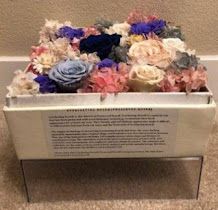The USPTO refused registration of the proposed mark EVERLASTING ROSE for "Ornaments of glass; Ornaments of glass, namely, glass roses," finding confusion likely with the identical mark registered for "Dried flower arrangements; Dried flowers; Flowers, dried, for decoration." Applicant submitted three third-party registrations for EVERLASTING-formative marks (for baskets for flower arrangements, live plants, and jewelry) in arguing that "EVERLASTING" is a weak formative, and it pointed to registrant's arguments regarding the weakness of "EVERLASTING" when the registrant overcame a refusal of its underlying application. How do you think this came out? In re 1-800-FLOWERS.COM, Inc., Serial No. 88690528 (December 6, 2021) [not precedential] (Opinion by Judge Cindy B. Greenbaum).
Absent proof of use, third-party registrations do not impact the
commercial strength of the cited mark. However, coupled with a
dictionary definition of "everlasting," this evidence led
the Board to conclude that "everlasting" is suggestive of
dried flowers, "as consumers would expect the dried flowers to
last longer than live flowers, but they would not expect them to
last literally forever." In any event, none of the three
third-party marks is as close to registrant's mark as is
applicant's mark. [How could they be? - ed.].
As to registrant's prior arguments, the Board observed that
"file wrapper estoppel is not applicable in trademark cases,
nor is it [sic] an admission against interest." In short, the
registrant's prior argument has limited probative value:
The Board found that the cited mark is not weak and is entitled to
the normal scope of protection of an inherently distinctive
mark.
Turning to the involved goods, the Board found them to be "related on their face [sic] in that both cover goods of a type that may be used (separately or together) as decorative home décor enhancements for rooms and as centerpieces for tables or mantles." Furthermore, "ornaments of glass" in the subject application "may be sold filled with 'dried flowers' such as those identified in the cited registration for use as a decoration or as a keepsake." [Ornaments of glass may be filled with jelly beans, too - does that make jelly beans related? - ed.].
Third-party registrations and internet evidence supported the Board's finding of relatedness. The internet evidence demonstrated that the involved goods "move in the same channels of trade, namely, florist shops, and they are sold to the same classes of consumers, namely, members of the general public. Thus, the channels of trade and classes of purchasers for the goods overlap."
And so, the Board affirmed the refusal to register.
The content of this article is intended to provide a general guide to the subject matter. Specialist advice should be sought about your specific circumstances.


